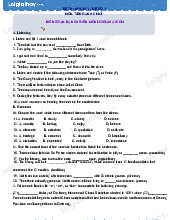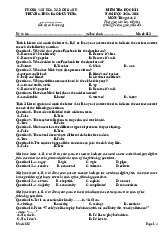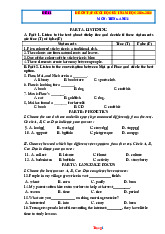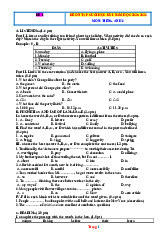






Preview text:
Đề cương ôn thi học kì 1 môn Tiếng Anh lớp 8 chi tiết nhất
I. Lý thuyết ôn thi học kì 1 Tiếng Anh 8
1. Comparisons of adjs and advs: So sánh của tính từ và trạng từ
2. Simple sentences, compound sentences, complex sentences: Câu đơn ,câu ghép, câu phức
3. must/ mustn't/ should/ shouldn't /have to /don't have to
4. Tenses: Simple past - Past continuous; Verbs of liking
5. Passive porm: Dạng bị động
II. Các dạng bài tập tiếng Anh 8 học kì 1 A - PHONETICS
Question I. Find the word which has different sound in the part underlined.
1. A. wanted B. worshipped C. needed D. expected
2. A. beds B. dogs C. porters D. books
3. A. wanted B. respected C. played D. celebrated
4. A. celebrated B. commemorated C. worshipped D. decided
5. A. community B. computer C. museum D. customs
6. A. celebration B. question C. action D. nation
7. A. played B. opened C. needed D. lived
8. A. minority B. ethnic C. tradition D. religion
9. A. diverse B. explore C. relax D. remote
10. A. ethnic B. south C. clothing D. healthy
Question II. Choose the word which has a different stress pattern from the others.
1. A. possessions B. unhealthy C. extended D. legalize 2. A. protection B. variety C. industrial D. nation 3. A. attention
B. effective C. children D. approach 4. A. population B. basis C. chairman D. country 5. A. cattle B. collect C. generous D. grassland 6. A. normad B. paddy C. robot D. disturb 7. A. stranger B. people C. replace D. factory 8. A. reputation B. difficult C. possible D. excellent 9. A. visitors
B. museum C. computer D. important 10. A. worship B. belong C. enjoy D. behave B. USE OF LANGUAGE
Question I. Choose the best answer.
1. My dad doesn’t mind ________ my mom from work every day. A. pick up B. picked up C. picking up D. picks up
2. Among the_________, the Tay people have the largest population. A. groups B. cultures C. ethnic minorities D. ethnic
3. Viet Nam is ________ multicultural country with 54 ethnic groups. A. a B. an C. the D. A and B
4. Tet is an occasion for family_________ in Viet Nam. A. visiting B. meeting C. reunions D. seeing
5. Saint Giong was unable to talk, smile, or walk_________he was three years old. A. If B. because C. while D. even though
6. We do not have many carnivals in Viet Nam; ________, we have many tradition festivals. A. nevertheless B. while C. although D. because
7. At school, the teacher and students________ follow the rules. A. has to B. have to C. need to D. haven’t to
8. The US is a_________country with over 80 ethnic groups. A. multi-cultural B. bi-lingual C. rich D. ethnic
9. So many people nowadays are_________computers and mobile phones. They use them a lot. A. addicted B. bored C. worried about D. afraid of
10. While I__________the performance, I met one of my old friends. A. watched B. was watching C. watch D. am watching
Question II. Give the correct form of the following words:
1. When I came, the whole family (have) _____________ dinner around a big dining table.
2. Children should (take)_____________ things from adults with both hands.
3. The girl (cry)_____________ when a fairy appeared.
4. They ( learn)_____________ English at the moment.
5. We (go) _____________ to Hung King Festival since last Sunday.
6. I (go) _________to school by bicycle at 6. 30 yesterday.
7. When I (come)_________ home from work, my mother was cooking dinner.
8. He (play) __________________ football when his mother came.
9. Ba enjoys (play)_________________ football in the morning.
10. When I (come) __________ home from work yesterday, my father was watching TV. PART C. READING
I. Read the text carefully, then choose the correct answers.
Elephant Racing Festival, one of the biggest festivals in Tay Nguyen, is held (1)________ in the third lunar month.
As preparation for the festival, villagers (2)________ their elephants with a wide range of food apart from
grass, including corns, sugar canes, sweet potatoes, papayas, and bananas. Also, in order to preserve their
strength, the elephants take a rest (3)________ hard work.
On the day of the event, elephants from several villages (4)________ at Don Village. Each time, ten
elephants will run at the same time for about one or two kilometers. The competition is guided by the sound
of tu va, a kind of horn. The first elephant (5)________ reaches the appointed destination will receive a
laurel wreath as a sign of victory, and it will enjoy the achievement excitedly with sugar canes and bananas
from surrounding people. (6)________ finishing the race at Don Village, the elephants move to Serepok
River for competition – swimming. They also participate in games (7)________ football and tug of war.
At the end of the festive day, all festival goers mass at Don Village’s community house for feasting, drinking
stem wine, and dancing in a jubilant (8)________ with the boisterous sound of gongs and drums.
1. a. mostly b. constantly c. monthly d. annually
2. a. poach b. herd c. feed d. train
3. a. without b. with c. of d. from
4. a. come b. drive c. round d. gather
5. a. who b. what c. which d. whose
6. a. Although b. After c. While d. However
7. a. alike b. like c. likely d. liking
8. a. atmosphere b. experience c. tradition d. feature
II. Read the text carefully, then choose the correct answers.
Tran Temple Festival, one of the largest annual spring festivals in Vietnam, is held on the 14th night and 15th
day of the first lunar month at the national historical complex of the Tran Kings’ shrines and tombs in Tien
Duc Commune, Hung Ha District, Nam Dinh City. It usually begins with an incense-offering rite at the kings’
tombs and a ritual for the opening of the gates of Den Thanh (Thanh Temple), Den Mau (Mother Temple)
and the Tran Kings’ shrines. They are followed by a ‘water procession’, in which people will carry nine ornate
palanquins with memorial plaques of the Kings of the Tran Dynasty and members of their royal families. A
series of folk games are also organized during the festival, such as a rice-cooking challenge, clay
firecrackers, chung cake wrapping and tug of war, alongside traditional performances and sport games
including lion dances, dragon dances, cheo and chau van singing, human chess, wrestling and martial arts.
The Tran Temple Festival was recognized as a national intangible heritage in 2014. The historical complex of
the Tran Kings’ shrines and tombs received special national relic status last year.
- ornate (adj): được sơn son thiếp vàng - palanquin (n): kiệu rước (lễ hội)
1. How often is the Tran Temple Festival held? a. every month b. every year c. every two years d. twice a year
2. The Tran Temple Festival usually begins with ________. a. formal ceremonies b. a water procession c. prayers of thanks
d. incense offerings to the gods
3. The word ‘they’ in the passage refers to ________. a. temples b. offerings c. shrines d. rituals
4. What does ‘plaque’ mean?
a. a large picture printed on paperb.
a wide piece of cloth with a message on it
c. a small piece of paper with information on it
d. a flat piece of metal, wood or stone with writing on it
5. Which of the followings is not organized in the festival? a. rice cooking b. tug of war c. boat race d. human chess
6. Based on the information in the text, which statement is false?
a. The Tran Temple Festival aims to honour the Tran Dynasty.
b. The seal opening ceremony takes place on the 14th night.
c. The main rituals are preceded by a water procession.
d. Traditional cheo and chau van singing is performed in the festival.
7, Which of the followings is not mentioned in the text?
a. The Tran Dynasty is the most brilliant reign in Vietnamese history.
b. Tran Temple Festival was recognized as a national intangible heritage.
c. Nine ornate palanquins are carried in the water procession.
d. There are plenty of activities to keep festival goers entertained.
III. Cách chuẩn bị ôn tập học kì 1 môn Tiếng Anh lớp 8
Chuẩn bị ôn tập cho học kì 1 môn Tiếng Anh lớp 8 là một quá trình quan trọng để bạn đạt được kết quả tốt
trong kỳ thi. Dưới đây là một số gợi ý về cách chuẩn bị và ôn tập hiệu quả:
Xác định mục tiêu ôn tập: Đầu tiên, bạn cần xác định những mục tiêu cụ thể bạn muốn đạt được trong
kỳ thi. Điều này sẽ giúp bạn hướng dẫn quá trình ôn tập và tập trung vào những khía cạnh quan trọng nhất.
Tạo lịch ôn tập: Xây dựng một lịch ôn tập có kế hoạch, bao gồm các ngày, thời gian, và chủ đề cụ thể
bạn sẽ ôn tập. Phân chia thời gian hợp lý để không gây căng thẳng cho bản thân.
Đánh giá kiến thức hiện tại: Trước khi bắt đầu ôn tập, hãy đánh giá kiến thức hiện tại của bạn bằng
cách làm một bài kiểm tra nhỏ hoặc xem lại những bài học đã học. Điều này giúp bạn xác định những
khía cạnh mà bạn cần tập trung ôn tập hơn.
Sử dụng tài liệu ôn tập: Sử dụng sách giáo trình, sách ôn tập, tài liệu tham khảo và bài tập trên mạng
để ôn tập kiến thức. Đảm bảo bạn hiểu rõ cấu trúc, từ vựng, ngữ pháp và kỹ năng đọc, viết, nghe, nói.
Tạo flashcard và sổ từ vựng: Viết từ vựng mới hoặc các mẫu câu quan trọng lên flashcard hoặc sổ từ
vựng để dễ dàng ôn tập và nhớ lâu hơn.
Lập kế hoạch ôn từ vựng: Mỗi ngày, hãy chọn một số từ vựng mới để ôn tập. Sử dụng chúng trong
các câu với ý nghĩa cụ thể để tạo liên kết với bối cảnh thực tế.
Ôn ngữ pháp và cấu trúc câu: Dành thời gian ôn tập các cấu trúc câu cơ bản và ngữ pháp quan trọng.
Làm bài tập thực hành để củng cố kiến thức.
Thực hiện bài tập và đề thi: Làm các bài tập và đề thi mẫu từ sách giáo trình hoặc trên mạng để làm
quen với định dạng và cấu trúc đề thi.
Học từ sách giáo trình: Đặc biệt chú ý đến các phần được giáo viên nhấn mạnh trong sách giáo trình.
Đây thường là những kiến thức quan trọng và sẽ xuất hiện trong kỳ thi.
Ôn luyện kỹ năng nghe và nói: Luyện tập nghe tiếng Anh thông qua video, bài hát, podcast hoặc phần
nghe trong sách giáo trình. Thực hành nói bằng cách tự hỏi và trả lời các câu hỏi về chủ đề liên quan.
Nhóm ôn tập: Nếu bạn có thể, hãy tham gia vào nhóm ôn tập với bạn bè. Cùng nhau thảo luận, trao
đổi và giải quyết các vấn đề khó khăn.
Tham gia các khóa học ôn tập trực tuyến: Nếu có khả năng, bạn có thể tham gia các khóa học ôn tập
trực tuyến hoặc xem video hướng dẫn để có cách tiếp cận mới và đa dạng.
Tạo câu chuyện hoặc viết văn bản: Sử dụng kiến thức và từ vựng đã học để tạo câu chuyện hoặc viết
văn bản về các chủ đề liên quan. Điều này giúp củng cố khả năng viết và ứng dụng từ vựng vào ngữ cảnh thực tế.
Ôn tập đều đặn và kiên trì: Hãy ôn tập một cách đều đặn và kiên trì, không để mọi việc đổ dồn vào phút cuối.
Nghỉ ngơi đầy đủ và duy trì sức khỏe: Đảm bảo bạn có đủ giấc ngủ và duy trì lối sống lành mạnh trong
thời gian ôn tập. Sức khỏe tốt sẽ giúp bạn tập trung và hấp thụ kiến thức tốt hơn.




